When Russia banned food imports from Western countries last week, cheese-lovers were horrified. In the upcoming decimation of consumer choice, the cheese shelves looked particularly vulnerable. Camembert, Parmesan, Edam, Cheddar — all would be swept away, leaving behind only their bland, rubbery, plastic-wrapped Russian peers.
But the supermarket shelves are unlikely to empty completely. Over two decades of capitalism, Russian cheese makers have learned that European lookalike branding sells. That Italian-looking mozzarella that you've been buying all this time? It turns out it was made in the Moscow region. Choice will take a hit, but not collapse. Only the top, authentic brands will disappear.
But prices are likely to rise across the board. According to a government report obtained by ITAR-Tass, when Russia retaliated to the sanctions of Western countries — designed to force Russia to abandon support for separatist rebels fighting in eastern Ukraine — with food import bans against them, it cut the supply of 30 percent of the cheese consumed in Russia, or 263,000 tons per year.
That volume will need replacing, either with new imports or domestic production. But whole milk already costs 30 percent more in Russia than in Europe, the head of dairy manufacturer Umalat, Alexei Martynenko, told Vedomosti this week. And the price is likely to rise. Demand for milk from Russian cheese-makers seeking to boost production will jump, just as supply falls — Russia produces less milk than it uses, and milk imports from Europe also come under the ban.
So as a milk supply pinch sharpens a cheese supply pinch, even the mass of low-income Russians — for whom the loss of authentic French Brie is more a welcome slap in the face for rich liberal urban elites than an infringement on their shopping habits — will be hit by price rises.
Swiss Bonanza
Despite their arsenals of famous cheese names, France and Italy supply only 2 percent of Russia's total cheese imports. Indeed, Russia's 140 million inhabitants consume only 10 tons of high-end hard cheese each month, Martynenko said.
According to Federal Customs Service data, Russia in 2012 got 21 percent of its imported cheese from Germany, 21 percent from Ukraine, 12 percent from Lithuania, 12 percent from the Netherlands, 10 percent from Finland and 8 percent from Poland.
One retailer that will see its cheese selection particularly struck by the ban is Azbuka Vkusa, a chain of 70 premium supermarkets in Moscow and St. Petersburg that specializes in expensive foreign brands. But its CEO, Maxim Koscheyenko, said the situation for cheese-lovers was not hopeless. One reason is that the countries affected by the embargo —? the U.S., Canada, the EU, Australia and Norway — are not the world's only cheese makers.
"We are looking at other countries that are not affected by the new sanctions. For instance, Switzerland," Koscheenko told The Moscow Times in a phone interview.
Switzerland sent 92 tons of hard and soft cheeses worth just more than $1 million to Russia in first quarter of 2014, according to the Federal Customs Service, but volumes may soon swell. Even if the country does not turn into a re-export point for other countries' cheeses, Swiss Gruyere could replace Italian Parmesan and Grana Padano — essential ingredients in Italian restaurants in Moscow, St. Petersburg and other big cities, said Mikhail Mishchenko, one of the leading dairy experts in Russia and editor of the Dairy News website. ?
"We will lose Italy's Parmigiano-Reggiano and French Comte, but the situation is not hopeless," he said.
Moscow Mozzarella
Premium retailers can also buy local. Russia already produces its own Ricotta, Mozarella and Mascarpone cheeses, among others, and could become completely self-sufficient in terms of soft cheeses used heavily used in pizzas.
Alexei Martynenko owns a company that makes cheeses under the Unagrande brand, and supplies them to high-end Moscow restaurants. In supermarkets, Martynenko's Ricotta and Mozarella is sold in colorful wrapping artfully designed deliberately to look as if it is produced in Italy, rather than in Russia's Bryansk region.
"Most of our rivals have already built factories in Russia. Also, in a few months you could build and modernize factories in Serbia to make any kinds of cheeses, including Parmesan and Gorgonzola," Martynenko told The Moscow Times in emailed comments.
There are also smaller, boutique producers that, according to Mischchenko, make very high quality soft cheeses, such as Signore Formaggio in the Moscow region and Mosmedynagroprom in the Kaluga region.
"What will happen is that brands will remain foreign, but their factories will either be in Russia or in the countries that are not on the sanctions list," he said.
Contact the author at i.nechepurenko@imedia.ru
A Message from The Moscow Times:
Dear readers,
We are facing unprecedented challenges. Russia's Prosecutor General's Office has designated The Moscow Times as an "undesirable" organization, criminalizing our work and putting our staff at risk of prosecution. This follows our earlier unjust labeling as a "foreign agent."
These actions are direct attempts to silence independent journalism in Russia. The authorities claim our work "discredits the decisions of the Russian leadership." We see things differently: we strive to provide accurate, unbiased reporting on Russia.
We, the journalists of The Moscow Times, refuse to be silenced. But to continue our work, we need your help.
Your support, no matter how small, makes a world of difference. If you can, please support us monthly starting from just $2. It's quick to set up, and every contribution makes a significant impact.
By supporting The Moscow Times, you're defending open, independent journalism in the face of repression. Thank you for standing with us.
Remind me later.


